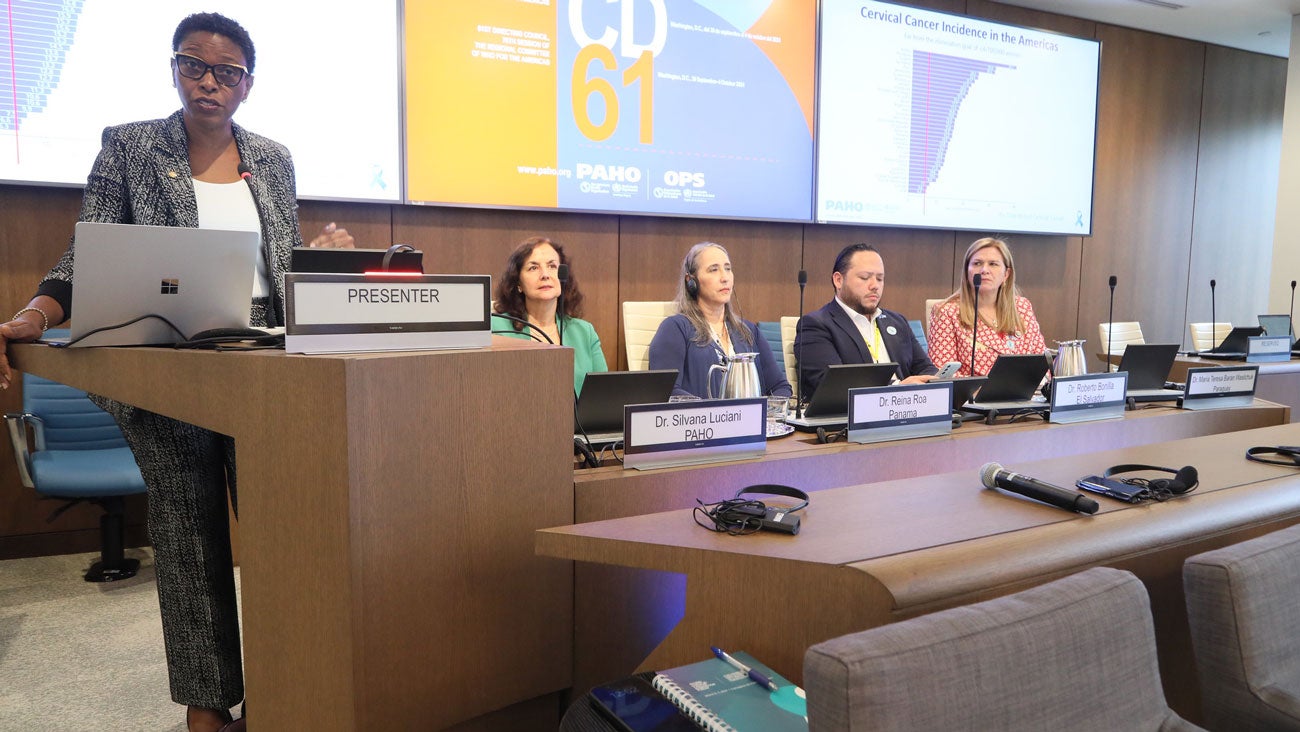
Washington, DC, October 2, 2024 – If the Region of the Americas is to become the first to eliminate cervical cancer, countries must step up efforts to implement comprehensive programs to expand HPV vaccination coverage, implement HPV testing, and increase access to treatment for precancerous lesions and invasive cancer, Pan American Health Organization (PAHO) Director, Dr. Jarbas Barbosa said.
Speaking at a briefing session on Cervical Cancer Elimination at the Organization’s 61st Directing Council, the PAHO Director highlighted that “the elimination of cervical cancer could save the lives of more than 40,000 women each year in the Americas.”
“Adopting single-dose HPV vaccination schedules, particularly in schools, as well as widely using HPV tests, are some of the key measures to address this disease and ensure that the Americas are, once again, at the forefront of accelerating progress towards the disease elimination,” he added.
Cervical cancer affects more than 78,000 women in the Americas, causing 40,000 deaths each year, 87% of which are in Latin America and the Caribbean, where mortality rates are three times higher than in North America. Cervical cancer continues to disproportionately impact women in low and middle-income countries.
The main cause of cervical cancer is infection with high-risk human papillomaviruses (HPV), which can be prevented through vaccination during childhood and early adolescence.
To advance the elimination of cervical cancer, World Health Organization (WHO) member states adopted the Strategy to Accelerate the Elimination of Cervical Cancer as a Public Health Problem. The Strategy proposes three targets for countries by 2030:
- 90% coverage of HPV vaccination in girls (by age 15);
- 70% coverage of screening (70% of women are screened with high-performance tests by the ages of 35 and 45 years);
- 90% treatment of precancerous lesions and management of 90% of invasive cancer cases.
During the session, PAHO Assistant Director, Dr. Rhonda Sealey-Thomas presented data reflecting the Region’s progress towards the elimination goals. So far, 48 of the 51 countries and territories in the Region have included the HPV vaccine in their national vaccination programs, and approximately 50% of countries have adopted the single-dose vaccine, simplifying implementation and increasing coverage.
Regarding screening, to date, only four countries in Latin America and the Caribbean have incorporated HPV testing into their national health systems.
During the session, several high-level officials participated in a panel to share their experiences of advancing cervical cancer eliminations: Dr. Reina Roa, Director General of National Public Health of the Ministry of Health of the Republic of Panama, underscored the importance of her country’s efforts to incorporate the HPV vaccine into national vaccination schedules by offering the vaccine at school and in health care centers. Dr. Roberto Bonilla, Chief of the International Office of the Ministry of Health of El Salvador discussed the country’s comprehensive cervical cancer elimination strategy, which includes the introduction of the HPV vaccine, as well as primary screening for HPV, followed by the treatment of precancerous lesions with thermos-ablation. Dr. María Teresa Barán Wasilchuk, Minister of Public Health and Social Welfare of Paraguay discussed the implementation of HPV testing in Paraguay, where 200,000 tests have already been acquired.
PAHO's Commitment
“Through PAHO’s Regional Revolving Funds, HPV vaccines, HPV tests and ablative treatment devices are available to our Member States at one unique price regardless of the purchase size,” Dr. Barbosa said. “I reaffirm PAHO’s commitment to work closely with all of you, bringing together partners, technical cooperation, and resources to accelerate the implementation of the strategies that will contribute to our Region being the first in the world to reach the 90-70-90 targets by 2030, and save women’s lives from cervical cancer.”




